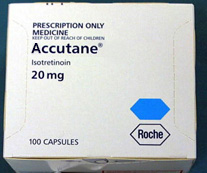Common use
Isotretinoin is a retinoid (derives from vitamin A, and is found in small quantities naturally in the body) used for the treatment of severe acne. It can be also used in other cases.
Dosage and direction
Take Accutane by mouth with a glass of water, with or without food. Avoid cutting, crushing or chewing this medicine.
Do not take the medicine more often than it is prescribed. Do not give up taking it except on the advice of your doctor.
It may need time for the medicine to help.
Consult your doctor concerning proper dose for you.
Precautions
Inform your health care professional if you have any allergies or if you have diabetes, osteoporosis or other bone disorders, asthma, heart disease, kidney or liver problems. Avoid taking vitamin supplements that contain vitamin A.
Avoid drinking alcohol and smoking while being treated with this medication.
Aged people can be more sensitive to side effects of the medicine.
Inform your doctor if you are pregnant or breast-feed.
Contraindications
Accutane should not be used by patients having demonstrated a reaction of hypersensitivity to it.
Possible side effects
The most common side effects are drowsiness, constipation, headache, dizziness, vomiting, diarrhea, skin rashes.
A very serious allergic reaction rarely occurs. Many people using this medicine do not have serious side effects.
Turn to your doctor or pharmacist for more details.
In case you notice the effects not listed here, contact your doctor or pharmacist.
Drug interactions
Before taking Accutane tell your doctor or chemist of all prescription and non-prescription medicines you are taking.
Accutane should not be used with
* tetracycline antibiotics
* steroids (prednisone and others)
* seizure medication such as phenytoin (Dilantin).
Turn to your doctor or pharmacist for more details.
Missed dose
If you have missed your dose, take it as soon as you remember. If you see that it is near the time for the next dose, skip the missed dose and resume your usual dosing schedule. Do not take your dose twice.
Overdose
If you think you have used too much of this medicine seek emergency medical attention right away. The symptoms of overdose usually include chest pain, nausea, irregular heartbeat, and feeling light-headed or fainting.
Storage
Store your medicines at room temperature between 68-77 degrees F (20-25 degrees C) away from light and moisture. Do not store your drugs in the bathroom. Keep all drugs away from children and pets.
Disclaimer
We provide only general information about medications which does not cover all directions, possible drug integrations, or precautions. Information on the site cannot be used for self-treatment and self-diagnosis. Any specific instructions for a particular patient should be agreed with your health care adviser or doctor in charge of the case. We disclaim reliability of this information and mistakes it could contain. We are not responsible for any direct, indirect, special or other indirect damage as a result of any use of the information on this site and also for consequences of self-treatment.

